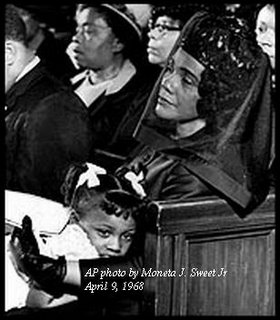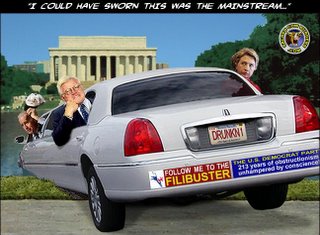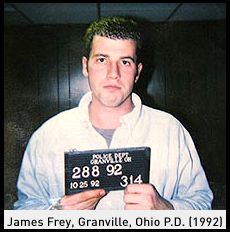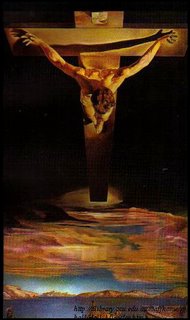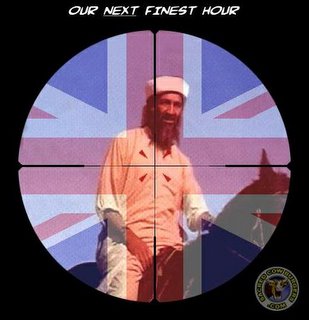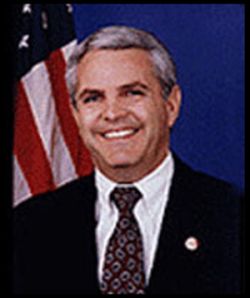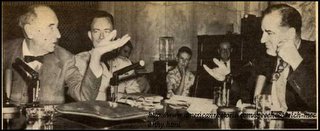 1 Corinthians 14:40 (New King James Version)
1 Corinthians 14:40 (New King James Version)
“Let all things be done decently and in order.”
Yesterday morning I sent a note to the office of Senator Edward Kennedy, expressing my displeasure with what he had attempted to do to Samuel Alito in the nomination hearings. A few hours later I got the following response:
“Thank you for your message. Hearing your views is important to me, because it allows me to better understand the constituents that I serve in the United States Senate. It makes me proud to know that my constituents take an active role in our government by corresponding with me, and I look forward to responding to your concerns in greater detail.”“As you can imagine, my office receives a great number of messages every day regarding a variety of issues. This is particularly true of e-mails. In the meantime, I just wanted to let you know that your e-mail has been received, and to ask for your patience until I send you a more detailed response.””Again, thank you for writing. Please feel free to visit my website http://kennedy.senate.gov to follow my work in the Senate and to learn more about the services my office can provide to you.”Warmest regardsTed Kennedy
I doubt that I will get any further correspondence from Senator Kennedy. If I do, I will publish it on this site.
What got me, a citizen outside his constituency, worked up enough to send correspondence the senator from Massachusetts? I can sum it up in two words – fairness and decency.
I have no problem with any senator asking a prospective Supreme Court justice difficult questions . I believe they have an obligation to do so. The issues that find their way to the High Court have, in a temporal sense, supreme importance to the citizens of this country. For example, beyond abortion, which seems to be the paramount concern of liberal Democrats, there are issues of property rights I believe were decided wrongly in favor of ordinary American citizens, particularly the poor, in
Kelo v. New London. In that five to four decision, the four liberal justices (Souter, Ginsberg, Stevens, Breyer) and one conservative (Kennedy), decided against Suzette Kelo, a citizen of New London, Connecticut in her attempt to save her property from an eminent domain claim by the city. She lost her case to both municipal and corporate interests. The Supreme Court decided that private economic development trumped her right to own the home she and her family had lived in for generations. I’m well aware of how eminent domain works. Twice in my life I’ve been impacted by it. When I was young, in high school, I lived in a very poor neighborhood near Cambridge, Massachusetts’ Central Square. Our family accommodations were far from regal. We rented an apartment that was adjacent to an alley outside a small Italian restaurant. Often, as patrons were leaving to go the parking lot on the other side of our building, they would bang playfully on our windows as they did. While things like this happened with some frequency, I always felt that having a roof over my head outweighed the irritation. I had a place to live. As all of this was going on I managed to win a school and commerce day essay contest sponsored by a civic group. One of the rewards for me was getting to attend a luncheon, sponsored by Rotary or Kiwanis, as a guest of honor. After lunch I was introduced to the gathering. Some of the attendees, upon finding out I lived on Brookline Street, in a depressed part of town, asked me what I thought about the new road that was being proposed by the City of Cambridge that would necessitate some private dwellings, including the apartment building I lived in, being claimed by the city under eminent domain provisions. I didn’t know then what eminent domain meant, so all I could do was profess ignorance. “What does eminent domain mean?” I asked. When I found out I was upset. “I don’t like it,” I said. “Why do they need to build the road through my house? Why not yours or someone else’s?”
Years later, in Memphis, the issue of eminent domain was to come up for me again. Nancy and I had just bought a home, a beautiful antebellum, near the University of Memphis. One of the things we weren’t aware of when we bought it was that the university had designs on the house we’d just purchased, along with several others on our block. They were considering asking the City to allow them to claim eminent domain so that they could replace the houses on our block with an arts center. I was a bit more sophisticated by this time. I understood that the
Fifth Amendment to the Constitution meant there are times when public benefit (a road, a hospital, a school) might outweigh my personal interests. I also knew that my property couldn’t be taken without just compensation. In the end we sold our home to the University of Memphis.
The Kelo ruling, which was affirmed in large part because of the liberal bloc of the Court, has broadened the definition of public use and eminent domain. Now, municipalities can claim that a home, a block of homes, or an area of a municipality can be declared blighted, freeing the municipality to sell the homes and land to private developers. If, for example, the City of Emporia decided that our neighborhood is blighted (there are some rentals in bad shape), it could claim eminent domain over the neighborhood, then sell it to private interests to enhance the city’s tax revenues. While it may not happen in Emporia, it will happen somewhere. Corporate interests wanting to build a shopping mall or a regional headquarters for their company or a series of trendy shops now have a mechanism available to them they’ve never had before. Who will be hurt by this ruling? The justices of the Supreme Court? Ted Kennedy? Of course not. It will hurt the poor, particularly minorities. Here in a small city like Emporia it would hit Hispanics particularly hard. It wouldn’t be overtly discriminatory. No one would target “them.” What “they” had would just need to give way to “public use,” as redefined by the Supreme Court. The sad reality is that the poor simply don’t have any economic clout, while developers do.
So, the Supreme Court has ruled. In time the heavy hand will drop on the rest of us, particularly the poor, in favor of corporate interests, just like it did on Suzette Kelo in New London, Connecticut.
I found it fascinating that, when questioned about the Kelo case, Judge Alito seemed to express some sympathy for people who will eventually be caught in the ugly squeeze created by this unique interpretation of public use the High Court has made. Upon hearing what he had to say the senate committee about eminent domain and the Fifth Amendment, I found a new measure of respect for the man. He may have made a difference in our favor had he been on the High Court when Kelo was being argued.
It doesn’t end for me with issues like eminent domain. Free speech is a paramount right guaranteed by our Constitution.
This morning I read an essay by Brian Anderson published in City Journal. The piece, titled “The Plot to Shush Rush and O’Reilly,” outlines some of the things legislators have been doing in the name of campaign finance reform. One of the things that’s especially troubling is the approach legislators and the courts are now taking vis a vis political speech on airwaves and the internet. I highly recommend you read the entire essay. It’s very enlightening. It’s also very frightening. There are a couple of portions of the essay that I’d like to highlight. First, there’s this:
“But when the chief House architects of campaign-finance reform, joined by McCain and Feingold, sued—claiming that the Internet was one big “loophole” that allowed big money to keep on corrupting—a federal judge agreed, ordering the FEC to clamp down on Web politics. Then-commissioner Bradley Smith and the two other Republicans on the FEC couldn’t persuade their Democratic colleagues to vote to appeal.”
“The FEC thus has plunged into what Smith calls a “bizarre” rule-making process that could shackle the political blogosphere. This would be a particular disaster for the Right, which has maintained its early advantage over the Left in the blogosphere, despite the emergence of big liberal sites like Daily Kos. Some 157 of the top 250 political blogs express right-leaning views, a recent liberal survey found. Reaching a growing and influential audience—hundreds of thousands of readers weekly (including most journalists) for the top conservative sites—the blogosphere has enabled the Right to counter the biases of the liberal media mainstream. Without the blogosphere, Howell Raines would still be the New York Times’s editor, Dan Rather would only now be retiring, garlanded with praise—and John Kerry might be president of the U.S., assuming that CBS News had gotten away with its last-minute falsehood about President Bush’s military service that the diligent bloggers at PowerLine, LittleGreenFootballs, and other sites swiftly debunked.”
Then there’s this:
“Two popular conservative talk radio hosts, Kirby Wilbur and John Carlson, explained why the gas tax was bad news and urged listeners to sign the 225,000 petitions necessary to get the rollback initiative on the November ballot, though they played no official role in the campaign and regularly featured on their shows defenders as well as opponents of the tax hike. With the hosts’ help, the petition drive got almost twice the needed signatures, but the ballot initiative, strongly opposed by labor unions, the state’s liberal media, environmental groups, and other powerful interests, narrowly lost.”
“Meantime, however, a group of pro-tax politicians sued No New Gas Tax, arguing that Wilbur’s and Carlson’s on-air commentaries were “in-kind contributions” and that the anti-tax campaign had failed to report them to the proper state authorities. The suit sought to stop NNGT from accepting any more of these “contributions” until it disclosed their worth—though how the initiative’s organizers could control media discussions or calculate their monetary value remained unclear. The complaint also socked NNGT with civil penalties, attorneys’ fees and costs, and other damages. Even more offensively, to litigate the suit the politicians hired a private law firm, Foster Pepper & Shefelman, which serves as bond counsel to Washington State. The firm, which represents unions, hospitals, and retirement funds among its other clients, could thus clean up from the state’s plan to sell gas-tax-backed bonds. Appearance of corruption, anyone?”
The same legal reasoning used by the State of Washington against Wilbur and Carlson can also be used against people expressing political views on the internet. McCain-Feingold has opened the door. So much for free speech.
I’m a blogger and I occasionally express my political views. Thousands of other bloggers, liberal, moderate, conservative, and radical, do the same. I don’t agree with everything I read. But I do believe that the Constitution affords me, a conservative, the right to freely express my political views. I also affords those I strongly disagree with that same right. McCain-Feingold can now be creatively used to stifle political speech of folks like me. It’s mind boggling enough that it begs the question, as Mr. Anderson noted:
“All this massively begs the question: Why should any American need government permission to express himself? Instead of a media exemption, blogger Glenn Reynolds sarcastically commented at a recent conference, maybe we need a “free speech exception, in which you are allowed to say what you want about political candidates without fear of prosecution by the government.”How did the Supreme Court feel about all of chilling effect that McCain-Feingold has already begun to have on free speech? In a five to four decision, with conservative justices Scalia, Thomas, and Kennedy dissenting, almost all provisions of the flawed law were upheld.
What did the majority opinion have to say about free speech?
“…the First Amendment would render Congress powerless to address more subtle but equally dispiriting forms of corruption.”
“[no person or group may engage in] broadcast, cable, or satellite communication that refers to a clearly identified candidate for Federal office; [and] is made within 60 days before a general, special, or runoff election for the office sought by the candidate; or 30 days before a primary or preference election…”
So, thanks to the High Court’s decision
in McConnell v. the Federal Election Commission, free political expression can be regulated by lawmakers. How’s that for liberality?
All of that is to say that the nomination of Samuel Alito to the Supreme Court is critically important to all of us. What was Ted Kennedy fixating on over the past few days?
A magazine subscription! “KENNEDY: You called CAP a “conservative alumni group.”
It also published a publication called Prospect, which includes articles by CAP members about the policies that the organization promoted. You're familiar with that?
ALITO: I don't recall seeing the magazine. I might have seen...
KENNEDY: Did you know that they had a magazine?
ALITO: I've learned of that in recent weeks.
KENNEDY: So a 1983 Prospect essay titled “In Defense of Elitism,” stated, quote, “People nowadays just don't seem to know their place. Everywhere one turns, blacks and Hispanics are demanding jobs simply because they're black and Hispanic. The physically handicapped are trying to gain equal representation in professional sports. And homosexuals are demanding the government vouchsafe them the right to bear children.”
Did you read that article?
FEINSTEIN: Finish the last line.
KENNEDY: Finish the last line -- is, “and homosexuals are...
FEINSTEIN: No, “And now here come women.”
KENNEDY: If the senator will let me just...
FEINSTEIN: Yes, I will...
(LAUGHTER)
KENNEDY: Can I get two more minutes from my friend from...
(LAUGHTER)
Just to continue along.
I apologize, Judge.
Did you read this article?
ALITO: I feel confident that I didn't. I'm not familiar with the article, and I don't know the context in which those things were said. But they are antithetical...
KENNEDY: Well, could you think of any context that they could be...
ALITO: Hard to imagine.
If that's what anybody was endorsing, I disagree with all of that. I would never endorse it. I never have endorsed it.
Had I thought that that's what this organization stood for I would never associate myself with it in any way.
KENNEDY: The June '84 edition of Prospect magazine contains a short article on AIDS. I know that we've come a long way since then in our understanding of the disease, but even for that time the insensitivity of statements in this article are breathtaking.
It announces that a team of doctors has found the AIDS virus in the rhesus monkeys was similar to the virus occurring in human beings.
KENNEDY: And the article then goes on with this terrible statement: "Now that the scientists must find humans, or rather homosexuals, to submit themselves to experimental treatment. Perhaps Princeton's Gay Alliance may want to hold an election."
You didn't read that article?
ALITO: I feel confident that I didn't, Senator, because I would not have anything to do with statements of that nature.”
This all has had my blood boiling for two reasons. First, the good senator from Massachusetts was giving little or no thought to issues of real importance, like eminent domain or free speech this week. Life experience has taught me that the right to property, as expressed in the Fifth Amendment, and free speech, which is guaranteed by the first amendment, is far more important than a magazine subscription.
It’s also angered me because I remember the Army-McCarthy hearings well. I was young, but I’ll never forget the character assassination the Democratic senator from Wisconsin engaged in. It was a shameful!
Read some of the following transcript yourself and see if you don’t agree:
McCarthy: Jim, will you get the citation, one of the citations showing that this was the legal arm of the Communist Party, and the length of time that he belonged, and the fact that he was recommended by Mr. Welch. I think that should be in the record....
Welch: Senator, you won't need anything in the record when I finish telling you this. Until this moment, Senator, I think I never really gauged your cruelty, or your recklessness. Fred Fisher is a young man who went to the Harvard Law School and came into my firm and is starting what looks to be a brilliant career with us. When I decided to work for this Committee, I asked Jim St. Clair, who sits on my right, to be my first assistant. I said to Jim, “Pick somebody in the firm to work under you that you would like.” He chose Fred Fisher, and they came down on an afternoon plane. That night, when we had taken a little stab at trying to see what the case is about, Fred Fisher and Jim St. Clair and I went to dinner together. I then said to these two young men, “Boys, I don't know anything about you, except I've always liked you, but if there's anything funny in the life of either one of you that would hurt anybody in this case, you speak up quick.”
And Fred Fisher said, "Mr. Welch, when I was in the law school, and for a period of months after, I belonged to the Lawyers' Guild," as you have suggested, Senator. He went on to say, "I am Secretary of the Young Republican's League in Newton with the son of [the] Massachusetts governor, and I have the respect and admiration of my community, and I'm sure I have the respect and admiration of the twenty-five lawyers or so in Hale & Dorr." And I said, "Fred, I just don't think I'm going to ask you to work on the case. If I do, one of these days that will come out, and go over national television, and it will just hurt like the dickens." And so, Senator, I asked him to go back to Boston. Little did I dream you could be so reckless and so cruel as to do an injury to that lad. It is, I regret to say, equally true that I fear he shall always bear a scar needlessly inflicted by you. If it were in my power to forgive you for your reckless cruelty, I would do so. I like to think I'm a gentle man, but your forgiveness will have to come from someone other than me.
McCarthy: Mr. Chairman, may I say that Mr. Welch talks about this being cruel and reckless. He was just baiting. He has been baiting Mr. Cohn here for hours, requesting that Mr. Cohn before sundown get out of any department of the government anyone who is serving the Communist cause. Now, I just give this man's record and I want to say, Mr. Welch, that it had been labeled long before he became a member, as early as 1944 --
Welch: Senator, may we not drop this? We know he belonged to the Lawyers' Guild.
McCarthy: Let me finish....
Welch: And Mr. Cohn nods his head at me. I did you, I think, no personal injury, Mr. Cohn?
Cohn: No, sir.
Welch: I meant to do you no personal injury.
Cohn: No, sir.
Welch: And if I did, I beg your pardon. Let us not assassinate this lad further, Senator.
McCarthy: Let's, let's --
Welch: You've done enough. Have you no sense of decency, sir, at long last? Have you left no sense of decency?Ted Kennedy crossed over the line. He abused his privilege. He has no decency. He has no shame. What he did was in the worst tradition of American politics. I’m not one of his constituents, so there’s little I can do to express my outrage about the offensive behavior he’s engaged in other than by way of correspondence or this blog.
If he, and some on the High Court have their way, my right to express those views could become subject to government oversight and control. That, it seems to me, is far more important than a magazine subscription!
